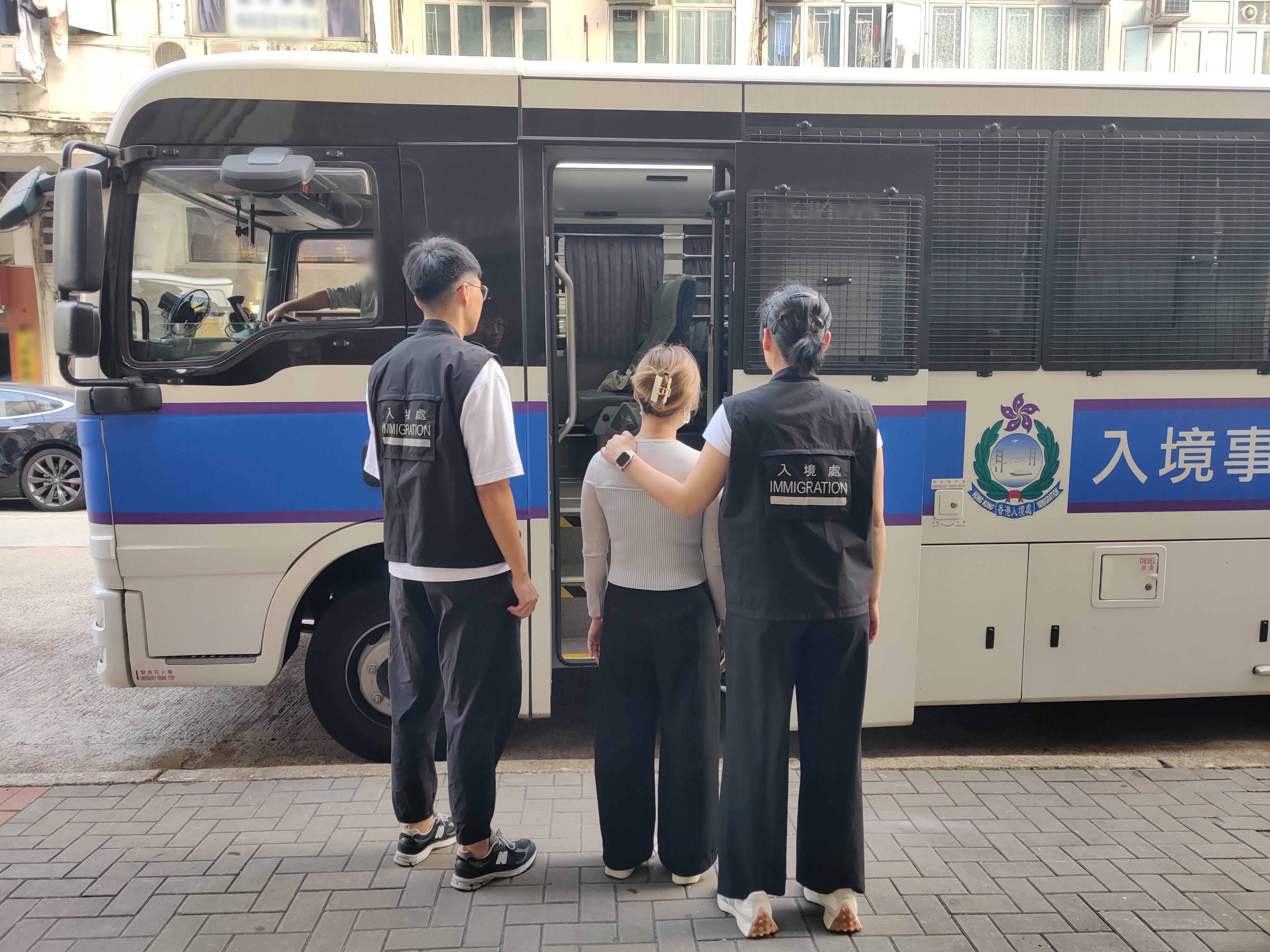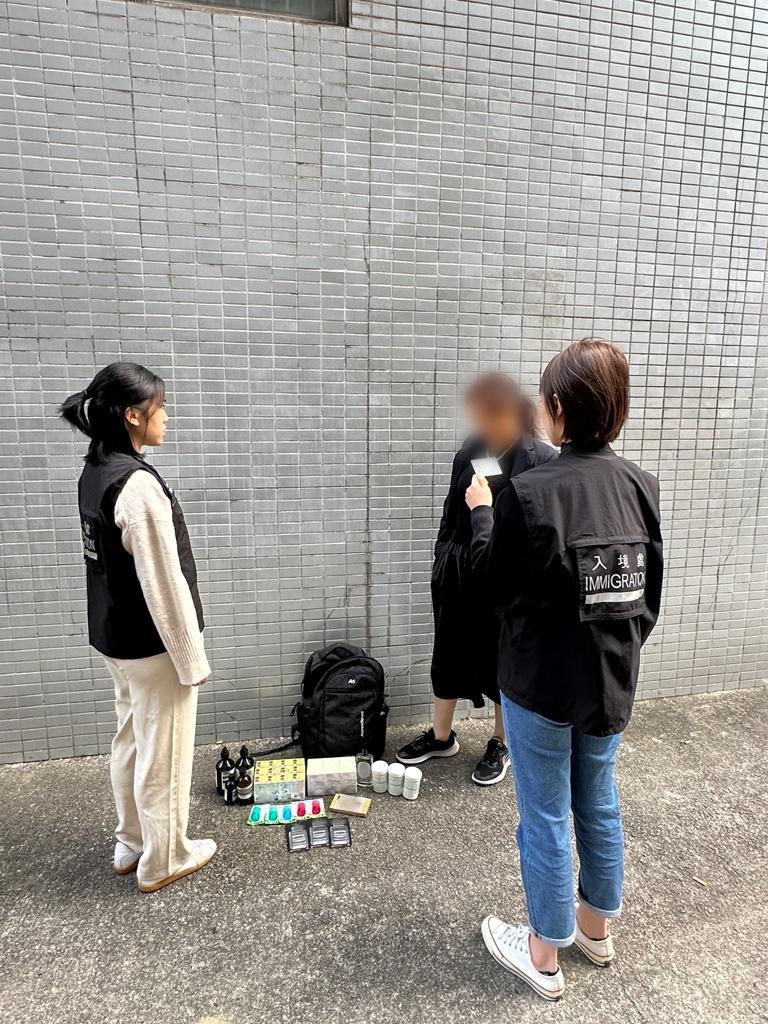29 persons arrested during anti-illegal worker operations (with photos)
The Immigration Department (ImmD) mounted a series of territory-wide anti-illegal worker operations codenamed “Fastrack”, “Lightshadow” and “Twilight”, and joint operations with the Hong Kong Police Force codenamed “Windsand” for four consecutive days from December 4 to yesterday (December 7). A total of 24 suspected illegal workers, four suspected employers and one suspected aider and abettor were arrested.
During the anti-illegal worker operations, ImmD Task Force officers raided 56 target locations including industrial buildings, massage parlors, premises under renovation, recycling yards, residential buildings and restaurants. Twenty-one suspected illegal workers, four suspected employers and one suspected aider and abettor were arrested. The arrested suspected illegal workers comprised five men and 16 women, aged 27 to 54. Among them, two men and four women were holders of recognisance forms, which prohibit them from taking any employment. Three men and one woman, aged 46 to 57, were suspected of employing the illegal workers and were also arrested. One woman, aged 39, who was suspected of aiding and abetting a person who breached the condition of stay in Hong Kong, was also arrested.
Furthermore, during operation “Windsand”, two male and one female Mainland visitors, aged 39 to 56, were arrested for breaching their conditions of stay by being involved in suspected parallel trading activities at Po Wan Road and San Wan Road in Sheung Shui district. The goods mainly included cosmetics products, daily necessities and health care products.
An ImmD spokesman said, “Any person who contravenes a condition of stay in force in respect of him or her shall be guilty of an offence. Also, visitors are not allowed to take employment in Hong Kong, whether paid or unpaid, without the permission of the Director of Immigration. Offenders are liable to prosecution and upon conviction face a maximum fine of $50,000 and up to two years’ imprisonment. Aiders and abettors are also liable to prosecution and penalties.”
The spokesman warned, “As stipulated in section 38AA of the Immigration Ordinance, an illegal immigrant, a person who is the subject of a removal order or a deportation order, an overstayer or a person who was refused permission to land is prohibited from taking any employment, whether paid or unpaid, or establishing or joining in any business. Offenders are liable upon conviction to a maximum fine of $50,000 and up to three years’ imprisonment.”
The spokesman reiterated that it is a serious offence to employ people who are not lawfully employable. Under the Immigration Ordinance, the maximum penalty for an employer employing a person who is not lawfully employable, i.e. an illegal immigrant, a person who is the subject of a removal order or a deportation order, an overstayer or a person who was refused permission to land, has been significantly increased from a fine of $350,000 and three years’ imprisonment to a fine of $500,000 and 10 years’ imprisonment to reflect the gravity of such offences. The director, manager, secretary, partner, etc, of the company concerned may also bear criminal liability. The High Court has laid down sentencing guidelines that the employer of an illegal worker should be given an immediate custodial sentence.
According to the court sentencing, employers must take all practicable steps to determine whether a person is lawfully employable prior to employment. Apart from inspecting a prospective employee’s identity card, the employer has the explicit duty to make enquiries regarding the person and ensure that the answers would not cast any reasonable doubt concerning the lawful employability of the person. The court will not accept failure to do so as a defence in proceedings. It is also an offence if an employer fails to inspect the job seeker’s valid travel document if the job seeker does not have a Hong Kong permanent identity card. Offenders are liable upon conviction to a maximum fine of $150,000 and to imprisonment for one year. In that connection, the spokesman would like to remind all employers not to defy the law by employing illegal workers. The ImmD will continue to take resolute enforcement action to combat such offences.
Under the existing mechanism, the ImmD will, as a standard procedure, conduct an initial screening of vulnerable persons, including illegal workers, illegal immigrants, sex workers and foreign domestic helpers, who are arrested during any operation with a view to ascertaining whether they are trafficking in persons (TIP) victims. When any TIP indicator is revealed in the initial screening, the ImmD officers will conduct a full debriefing and identification by using a standardised checklist to ascertain the presence of TIP elements, such as threats and coercion in the recruitment phase and the nature of exploitation. Identified TIP victims will be provided with various forms of support and assistance, including urgent intervention, medical services, counselling, shelter or temporary accommodation and other supporting services. The ImmD calls on TIP victims to report crimes to the relevant departments immediately.




